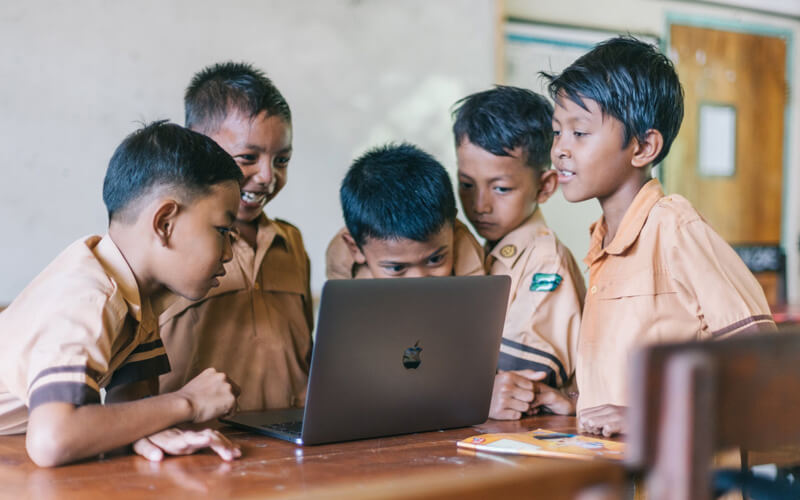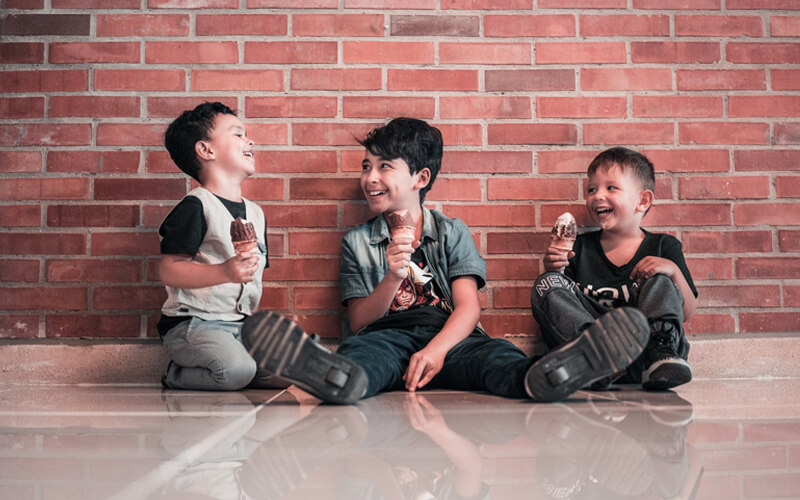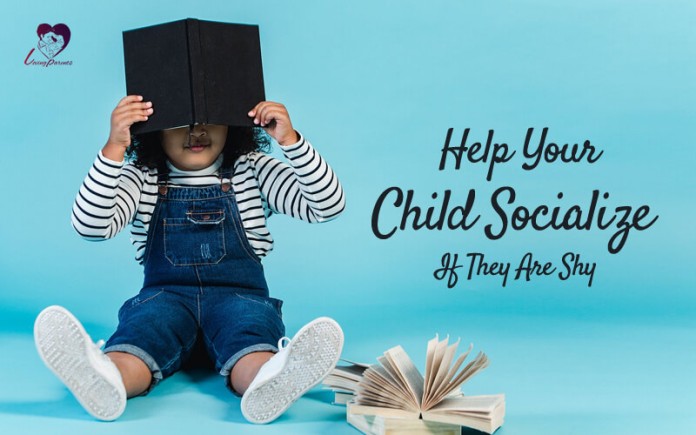Some children do not develop social skills as easily as others for one or another reason. They may seek peer relationships and then retreat to the safety of their family, home, and their own company. Know how to help your shy child socialize in this article.
Rejection of a child is the most painful thing for a parent. Parents have to look out for the long view of the social problem of their kid and map out a plan that solved it carefully and thoughtfully as they would consider health or academic problems. There are some guidelines out there that if we follow can help the children only if the parent is willing to take initiative and time.
All children are different and they go through definitive phases of social development. A young kid or an infant plays with his own company happily, babbling things to himself, and sometimes shares a treasure with their mother or father. If any other child wanders around the scene he is going to get clonked likely with a block. Next is a period when a child can play with other children and this can include elements that adjust to the idea of sharing, taking turns of who goes first or last and this is a bumpy road that is fraught with failure.
Some Kids Are Naturally More Inclined into Socializing

Read Also: Parental Love – Power and Importance
Some kids around make it look so easy that they can work with a room whit the best of laughing, playing, and giving high-fives to every kid around they meet. Within a few minutes, it feels like everyone knows their name and wants to play and be friends with them because they are born extroverts.
While on the opposite end of the spectrum there are kids who are shy. A shy child can be often seen hanging with their mom or dad or in the absence of them they would be sitting by themselves, not talking to anyone, and head down. They won’t try to engage or even hardly make any eye contact. If they try to say anything it’s usually difficult to understand what they said. The parents say to the teacher that the kid is not like that at home as they are non-stop talking and that is likely true. A shy child isn’t being unfriendly intentionally but in the presence of new people or an uneasy situation, it’s easier to disengage because they are born introverts.
Why Socialization is Important for A Child?

In a baby’s overall development social development is tied to many other parts which is why it is the most important thing to start socialization with other children around at a young age. Social interaction helps the young child to start to develop the sense of self and start to learn what others expect from them. For the social interaction that your child needs at their age try to send them to a preschool or child care center which will help them reach other developmental milestones.
Read Also: How To Socialize Toddler Without Daycare Or Schools During The Pandemic
While playing with other kids, children learn the skill that sticks bu them their whole life. The children who are young are egocentric by nature and putting them in child care or preschool will help the child to naturally come out of that phase. Setting boundaries, problem solving, and Sharing come from socializing and iterating with others. From other people, they learn to have empathy and recognize when their friend is sad, happy, or mad. Slowly and gradually kids will start using these skills at their home with parents, siblings, or even for say with their pets.
The preschool will also help the child learn discipline and consequences for their behavior. As they pick up social cues, they will eventually learn what behavior or reaction is appropriate and which are not. This will help them get the consistency they need in their social development. Their maturity will grow as they grow up.
Laying the foundation for socializing and problem solving is absolutely crucial at a very young age then the decision of choosing the right preschool and timing. Socialization is another factory that benefits the large development of a child and a child care setting is appropriate to support that.
How To Improve A Child Social Skills And Relationship Who Doesn’t Naturally Socialize

Read Also: Tips For Working Moms To Find Best Preschool For Their Child
Shyness is actually very common in the preschool years and that is a piece of good news for the parents. It is often a behavior that your little kid will outgrow as they become comfortable in their own skin and the people around them. You can do a lot of things to build their self-esteem and encourage them to have that bubbly personality you know to come out and love shine through. Let’s check what you can do.
Role Play :
Try to put a wonderful preschool imagination into an act that can be a common scenario for your little kid which he may encounter on a regular basis. You can use their toys or just be yourselves. Make your child imagine that they are entering the classroom. Now see what do they do? What do they say? And then you switch it. Now it’s your turn to play the role of a shy kid and let your kid be the one who helps. Pay good attention to the way they use to comfort you that will give you clues of your child’s behavior.
Share your Shyness :
It may have happened to you in your life where you have felt a bit shy of yourself. So tell that to your child. Share your story with your kid so that your empathy will show the kid that they were not alone in this journey of shyness. Everyone gets through this which will boost their morals.
Ask the question WHY :
There can be a reason for your child to act one way at the home and another way in front of others. So while they might have trouble expressing it with some exploratory question you can be able to get to the root of their behavior and help them solve the problem.
Prepare and Prepare and Prepare :
You may know ahead of time that your child will be facing a situation where he or she will be uncomfortable. It can be a large family gathering or birthday party or meeting of the playgroup. So before the event try to talk to your child about where you are going and what is going to happen there and who is going to be present there. This will make them prepare for the situation and having a game plan will help your kid feel more comfortable.
Help Your Kid in Making Friends :
Making new friends does not come naturally to anyone and for the preschoolers who are completely new to this activity will be a challenge. So try to intervene a bit. Try to start slowly, introduce your child to the same age child or to the ones they knew from school or even your neighborhood. If you find your child feeling comfortable around their new friend then your child is warming up well and then invite the other kid to play over with your child. As your child starts feeling comfortable in the presence of other kids then this is likely to carry over into other places. This is a sure time tested method to help your shy child socialize.
Don’t Call Them Introverts or Shy :
It is totally ok that your child acts shy but you don’t have to label it as such because giving labels stays with them forever, especially at such a young age. The more you talk about it and give a name the more your child will feel that there is something wrong with them and of course, there isn’t anything wrong. Being introverted or shy isn’t bad it’s just a part of your child’s personality. Preschool is the year where your child will experience a growth at different levels and of all kinds – emotional, physical, social, and behavioral.
As with all these developmental issues at the age patience, love and time work wonder.
Kids Social Skills

The following social skills should be there in a kid.
Sharing :
Sharing is a big part of our daily life which doesn’t mean it’s easy. Sharing is a difficult concept when it comes to young children. Preschoolers, toddlers, and kindergarteners have a difficult time as they are more focused on their own needs and desires than the desires and needs of others. And this is normal, the feeling that something belongs to them is much stronger than their desire to please the ones who are around them. Even so, it is hard to share we have to develop child’s social skills development as it helps to keep and advance their friendships. It is a great way of bonding and showing that you appreciate it.
Listening :
Listening actively is an important skill that some adults struggle with. We all know that this can be a challenging thing for young children but active listening strengthens their receptive language skills. These skills help the child to handle social interactions, understand stories, understand gestures, answer questions and comprehend what they are reading while developing these social skills the child will come to see how important it is to actively listen when the other person is speaking. For healthy communication paying attention to what someone is saying and responding directly to the statements is a big part.
Patience :
It is normal for a kid to be impatient but patience is really the most rewarding social skill for kids. Patience is critical including maintaining a relationship and friendship or achieving bog goals that can only be completed over an extended period of time and this is where the delayed gratification concept comes into play. When you help your child understand good things often takes time as you nurture them into the patient person. It takes practice to learn patience. It will come with time.
Empathy :
The ability to understand and share the feelings of another is empathy and your child will learn how to appreciate the differences and similarities between their lives and of those who they meet. No matter how different they are they will learn how to empathize with these people. This will help your shy child socialize.

